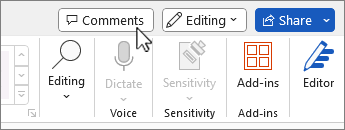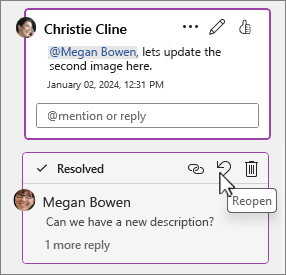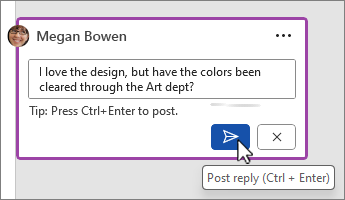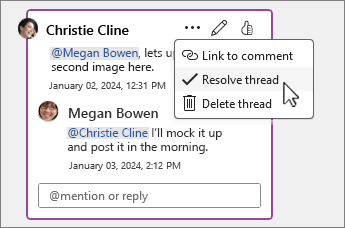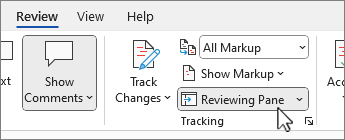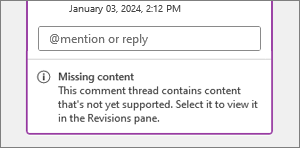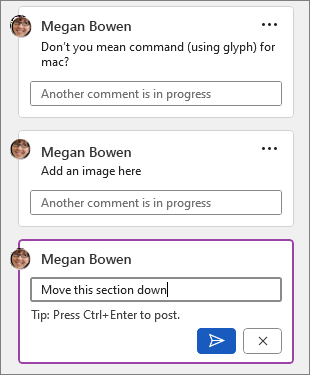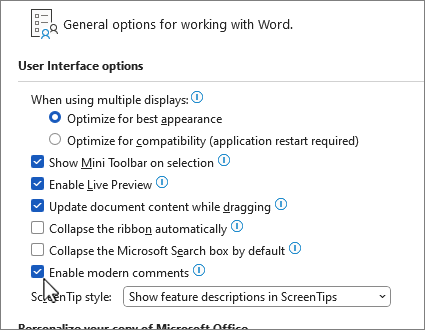The Modern comments experience in Word sets the stage for richer collaboration by your team with features such as @mention notifications. Word comments align across Word platforms and other Office apps, like Excel and PowerPoint.
Two ways to view comments
There are two views for comments, Contextual and List view. When you add a comment in Word using Contextual view, it appears in the Comments pane on the right margin near the insertion point in the text. In this view, all active comments are visible in context and resolved comments are hidden so you can focus on active comments.
List view opens the Comments pane on the far right and includes all active and resolved comments. The List view displays comments all together, rather than spread through the document. When you select a comment, a border appears around it, the item in the text is highlighted, and needed, the page scrolls to show the location.
You can switch between Contextual view and List view anytime by selecting the Comments button in the top right corner of the ribbon.
You can also switch from the ribbon:
-
Select the Review tab and choose the drop down arrow on the
-
Select
You can interact with comments in the Comments list pane the same as you would in the classic comments view. If you reopen a resolved comment in List view, it is visible again in the Contextual view.
Posting comments
Modern comments provides a
Previously, pressing Enter would immediately post a comment. This meant that any collaborators on a shared document might see your comment before it was complete. With modern comments, you can review and edit your comments before committing them.
Using comments
To add a comment
-
Select the text or an insertion point where you want to comment and do one of the following:
-
On the Review tab, select
-
In the Comments pane, select
-
Press Ctrl + Alt + M.
-
Right-click any text and select New comment in the context menu.
-
-
Write your comment and then select
To edit, delete, or resolve a comment
Modern comments continue to work like comments did before. To edit a comment, select the pencil icon. To delete, get a link, or resolve a comment thread from select More thread actions (...).
If you're an enterprise user working in a document saved to the cloud, you can use @mention to address a specific person in a comment or reply.
For more information about using @mentions, see the article Use @mention in comments to tag someone for feedback.
Assigning tasks
You can also use comments and @mention to assign a task. Just @mention someone, and then select the Assign to checkbox to assign the comment as a task.
Add an image to a comment
Put your cursor where you want the image or icon to be in the comment and do one of the following:
To add a picture
-
Select where to put the picture in a comment and choose the Insert tab.
-
Select
-
Choose a picture to use and select Open or Insert.
To add an Icon
-
On the Insert tab, select
-
Search for or choose a category.
-
Choose an icon from the gallery and then select Insert.
FAQs
Yes. Others using older versions of Word on any platform can see your comments.
You can press Ctrl + Enter in Windows, or ⌘ + Enter in MacOS to easily post your comment.
The new post model aligns with how comments work across Office and gives you confident control over what you share. If you @mention someone, Word notifies that person.
Modern comments currently supports the formatting.
-
Select some text and on the Home tab you can set:
-
Bold, italic, underline, and strikethrough.
-
Font colors.
-
Highlighting.
-
However, modern comments do not currently support showing or changing font size, styles, or paragraph settings.
To view or add unsupported formatting in existing comments, use the Revisions pane. However, unsupported formatting can only be viewed in the Revisions pane.
-
On the Review tab, select Reviewing Pane. The Revisions pane appears on the left edge.
If viewing and adding these formatting options in the default comment is essential to your workflow, let us know using the in-app feedback so we can prioritize future improvements to modern comments.
You can now add and view images in modern comments on Windows.
If you need to add other objects such as tables, equations, shapes, signatures, ink comments, special characters (such as date characters), or positional tabs, open the Revisions pane.
If you select a comment with unsupported content, the Revisions pane opens automatically. Word lets you know which comments might have unsupported content that doesn't yet display with a Missing content message.
If viewing and adding these other content types in the default comment cards is essential to your workflow, let us know using the in-app feedback so we can prioritize future improvements to modern comments.
Modern comments on Windows supports most AutoCorrect functionality, however there are some capabilities that are not yet fully supported. These include AutoFormat and Math AutoCorrect. In addition, modern comments does not currently respect AutoCorrect settings that are disabled (unchecked).
If AutoFormat or Math AutoCorrect features are essential to your workflow, let us know using the in-app feedback so we can prioritize future improvements to modern comments.
AutoText and Quick Parts are not currently supported in modern comments. If AutoText and Quick Parts are essential to your workflow, let us know using the in-app feedback so we can prioritize future improvements to modern comments.
Modern comments checks spelling, but doesn't support other advanced proofing tools, such as grammar suggestions, at this time. We're considering this feature for a future update.
With modern comments we've made anchoring the comment to the content easier to understand and we no longer use the dotted lines you're familiar with from classic comments. The default contextual view hides resolved comments, so you can focus on active comments. If you want to see all comments, open the Comments pane.
Do the following to keep track of the connection between comment cards and the places in the document they're associated with:
-
Select All Markup on the Review tab to show anchor highlights on the canvas by default.
-
Select the anchor highlight in the document to see added emphasis to the relevant comment card. Similarly, you can hover on or select the comment card to see added emphasis to the relevant anchor highlight.
-
Right-click a document anchor highlight and select
-
Select the
When you're drafting a comment, your comment can't be seen by others until you post it. Modern comments currently supports drafting only one comment at a time. If drafting more than one comment at a time is important to you, let us know using the in-app feedback so we can prioritize future improvements to modern comments.
When you're drafting a comment, other comment text boxes show the message Another comment is in progress. Select this message to return to your active draft.
In response to customer feedback and requests, we've made it so you can't edit others comments in a modern comment. However, you can still edit others' comments in the Reviewing pane.
To turn off modern comments on Windows and MacOS:
-
In Windows, on the File tab, select Options. In MacOS, select Word and choose Preferences.
-
On the General tab, clear the checkbox next to Enable modern comments.
-
Restart Word.
This allows you to temporarily revert the comments experience to the legacy comments model. This setting is temporary and will be removed in the future.
It may be that revisions are being displayed in balloons. As a workaround, all markup to display inline, so it doesn't show in the margin:
-
On the Review tab, select Show Markup in the Tracking area.
-
Select Balloons and choose Show All Revisions Inline.
Let us know how this works for you. We're continuing to explore the best options for using comments and tracked changes together.

